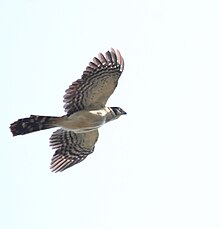Forest falcon
| Forest falcons | |
|---|---|

| |
| Collared forest falcon (Micrastur semitorquatus) | |
| Scientific classification | |
| Domain: | Eukaryota |
| Kingdom: | Animalia |
| Phylum: | Chordata |
| Class: | Aves |
| Order: | Falconiformes |
| Family: | Falconidae |
| Subfamily: | Herpetotherinae |
| Genus: | Micrastur G.R. Gray, 1841 |
| Type species | |
| Falco brachypterus[1] Temminck, 1822
| |
| Species | |
|
7 currently recognised: See text | |
Forest falcons are members of the genus Micrastur, part of the family Falconidae. They are endemic to the Americas, found from Mexico in the north, south through Central America and large parts of South America, and as far south as northern Argentina. Most are restricted to humid tropical and subtropical forests, but the two most widespread species, the collared and the barred forest falcon, also range into drier and more open habitats.[2]
Forest falcons, like most Accipiter-type hawks (but unlike other falcons), are adapted for agility in thick cover rather than outright speed in the open air. They have short wings, long tails, and extraordinarily acute hearing. While generally visually inconspicuous, their songs are commonly heard.
Their diet is a mixture of birds, mammals, and reptiles. Hunting is often performed in goshawk fashion: the bird takes up a perch in an inconspicuous position and waits for a prey species to pass, then strikes with a short, rapid pursuit. Forest falcons are inventive, flexible hunters, and at least some species (such as the relatively long-legged collared forest falcon) are also capable of catching terrestrial prey on foot.
In 2002, a new species was described, found in the Atlantic forest and the southeastern Amazon of Brazil (and later also confirmed for adjacent parts of Bolivia). It has been named Micrastur mintoni, the cryptic forest falcon, as it is phenotypically highly similar to M. gilvicollis.[3]
Species[edit]
| Image | Scientific name | Common Name | Distribution |
|---|---|---|---|
 |
Micrastur ruficollis | Barred forest falcon | south-eastern Brazil south to north-eastern Argentina and west to Paraguay |
| Micrastur plumbeus | Plumbeous forest falcon | Chocó in south-western Colombia and north-western Ecuador. | |
 |
Micrastur gilvicollis | Lined forest falcon | western and northern Amazon Basin. |
 |
Micrastur mintoni | Cryptic forest falcon | south-eastern Amazon rainforest in Brazil and Bolivia. |
| Micrastur mirandollei | Slaty-backed forest falcon | Bolivia, Brazil, Colombia, Costa Rica, Ecuador, French Guiana, Guyana, Panama, Peru, Suriname, and Venezuela. | |
| Micrastur semitorquatus | Collared forest falcon | Argentina, Belize, Bolivia, Brazil, Colombia, Costa Rica, Ecuador, El Salvador, French Guiana, Guatemala, Guyana, Honduras, Mexico, Nicaragua, Panama, Paraguay, Peru, Suriname and Venezuela. | |
 |
Micrastur buckleyi | Buckley's forest falcon | Peru, Ecuador and far southern Colombia. |
Taxonomy and systematics[edit]
Micrastur was defined by George Robert Gray in the second edition of his List of the Genera of Birds in 1841.[4][5] The type species was Temminck's Falco brachypterus, with Illiger's Falco concentricus as a synonym.[4]
Composition of species comprising the genus has varied, with differing opinions on whether particular populations are species or subspecies, and whether collected specimens were different life stages or plumage variants of the same species.
Sclater and Salvin commented in 1869 that "some of the members of the genus Micrastur are at present in a state of great confusion". They listed seven species,[6] of which four[7] are currently recognised and three[8] are considered subspecies.
In 1873, Robert Ridgway noted the similarity of Micrastur to the laughing falcon Herpetotheres. He wrote that "Eight species are given in Gray’s Hand List…, but of this number only five are tenable."[9][10]
References[edit]
- ^ "Psittacidae". aviansystematics.org. The Trust for Avian Systematics. Retrieved 2023-07-24.
- ^ Bierregaard, R. O. (1994) Species accounts - Genus Micrastur. In: Del Hojo J, Elliott A, Sargatal J (eds), Handbook of the Birds of the World, Volume 2, pp 252–254. Barcelona: Lynx Edicions
- ^ Whittaker, A. (2002). A new species of forest-falcon (Falconidae: Micrastur) from south eastern Amazonia and the rain forests of Brazil. Wilson Bulletin, 114, 421–445.
- ^ a b Gray, George Robert (1841). A list of the genera of birds : with their synonyma and an indication of the typical species of each genus (2 ed.). p. 6. On page 4 of the first edition, he lists "* !———–? Brachypterus Less."
- ^ Rees, Tony (2011). "Micrastur Gray, 1841". Interim Register of Marine and Non-marine Genera (IRMNG). Retrieved 31 October 2023.
- ^ Sclater, Philip Lutley; Salvin, Osbert. "Notes on the Species of the Genus Micrastur". Proceedings of the Zoological Society of London: 364–369. doi:10.1111/j.1469-7998.1869.tb07339.x.
- ^ M. semitorquatus, M. mirandollei, M. ruficollis, M. gilvicollis.
- ^ M. zonothorax, M. leucauchen, M. guerilla.
- ^ Those five were listed as: M. semitorquatus, M. mirandollei, M. ruficollis, M. leucauchen, and M. concentricus. He excluded M. castanilius as a species of Nisus (now Accipiter castanilius). He considered M. guerilla and M. zonothorax to be different forms of the same species, and that M. xanthothorax and M. gilvicollis were synonyms of M. ruficollis.
- ^ Ridgway, Robert (1873). "Revision of the falconine genera, Micrastur, Geranospiza and Rupornis, and the strigine genus, Glaucidium". Proceedings of the Boston Society of Natural History. 16: 73.
